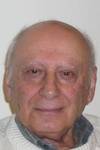Aus der REIHE MIGRATIONSGESCHICHTEN von Birgit Stegbauer (mehr InterviewpartnerInnen)
Manutschehr MOTTAHEDEH, 75: When the religious minority was being increasingly persecuted at the beginning of the Islamic revolution in Iran in 1979, the Persian-born Austrian sought protection with his family in Austria. No surprise then, that the architect advocates a separation of religion and state.
In my first home country Persia it was more prestigious to study abroad. That’s why I moved from my native town Tehran to Vienna in 1959 where I studied Mechanical and Electrical Engineering for a year but that meant nothing to me. I then tried architecture and got very good marks for it. My parents supported me financially and I worked for architects from time to time in Austria in Germany, and I learnt a lot from my work experience. I met my wife in Vienna and our first daughter was born there too.
Then we went to Persia together in 1969. As a self-employed architect I set up two architects’ practices in Tehran and had so many orders, among other things for town planning and overspill towns, that I wrote to colleagues in Austria, America and Persia and asked them if they’d like to work for me. At that time Persia was developing very quickly and dramatically in all ways. Then the students and intellectuals wanted to set up a democracy with the help of heads of religion, but it turned into the wrong type of revolution.
I’m Bahai* and as such in 1979 I was persecuted more and more because of intolerance towards the Bahai principles** - my life and my family’s were increasingly in danger. And I didn’t want my three daughters to grow up in those schools because it was clear that women would soon lose their rights. So we temporarily emigrated from Persia, but the religious persecution was the real reason. And we came to Austria again.
I intended to open an architect’s practice in Vienna, but it didn’t happen because of the crisis in construction at the time. Then I worked for a short time for architects in Austria. In the meantime I got an offer from a friend from Graz who had set up a firm for importing goods to open a branch office together in Villach. So we did that and I switched to the profession of carpet dealer. I finally set up a technology firm in 2000 and sometimes have 7 – 8 colleagues. In the meantime I’m retired and have gone back to trading again.
When I compare the atmosphere in Vienna when I was a student and after 1979, it’s all changed so much, not just materially: 1959 was just a few years after the Allies had left Austria so there was more animosity towards foreigners. When I came back in 1979 it was different: a lot had changed materially and the internationalization and globalization of markets was just starting.
This is what I thought then: we’ll fly back to Persia again - the situation’s changing there. I didn’t get citizenship straight away (my wife’s Austrian and our three daughters got Austrian citizenship shortly after we arrived in Vienna). Later my first application was rejected because there were some periods of residency missing. I tried again for a second time in 1981 and, with the support of Herr Ing. Mörtl who was mayor of Villach at the time, I was finally granted Austrian citizenship. Austria has been my second home country for a long time now.
In Austria I think it’s really good that everybody can say what he or she thinks, whether it’s political, religious or different, that’s intriguing. Because democracy, liberalism and liberal ways of thinking are very important to me. Also, that religion and politics are totally separate in Austria. All the governments of the world should be secular.
The concept of the European Union inspires me because it’s brought peace to Europe. For me as a Bahai the EU is a small model for world peace. Because we Bahai believe the Earth is one country and all the people on Earth are citizens of this country. We also believe that this unity must be a unity of diversity.
Forms of nationalism must be overcome. Therefore in my opinion it’s not right that in the media the country or the nationality of someone who’s committed a crime is explicitly given. They shouldn’t categorically write “A stranger has broken into two houses in Villach” but “In Villach two houses were broken into”.
Instead the Bahai concept of „unity in diversity“ should be taught to children in schools. There should even be a new school subject of internationalism and global ways of thinking. So that the nationality of somebody from a different religion isn’t something strange or different, but something I can learn more about than what I know now.
29.05.2013
Editor’s note:
*The Bahai religion is the youngest world religion. Around the world 5 – 8 million registered members live in 235 countries, therefore the Bahai religion is the most prevalent religion after Christianity. The religion has its origin in Persia where was established between the middle and the end of the nineteenth century by its founder Bah’ullah (source: Encyclopedia Britannica). In Iran the Bahai constitute the largest religious minority with around 300,000 members, but are subjected to intense persecution. In Austria Bahai currently live in over 180 communities. There are 19 local spiritual boards and one national spiritual board.
**Equal rights for men and women; the unity of humankind in its diversity; the overcoming of all prejudice, be it religious, social, racist or nationalistic; the general adoption of an international auxiliary language alongside native languages; the abolition of excessive wealth and poverty; consensus of science and religion; the establishment of a federal world state with proper decision-making powers equipped with a world court of law; the creation of universal peace.

